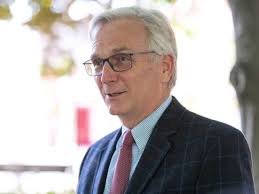Week Ahead – BoC to speed up rate cuts; flash PMIs eyed for growth clues

Thank you for inviting me to speak today.1 I have participated in this conference for nearly 20 years and have often presented my research on monetary theory, banking, and payments. So, I believe this is the right audience to speak to regarding the role of centralized finance and the emergence of decentralized finance, or defi for short. Over the past few years, there has been a lot of attention and work on defi, which will be a major focus of my remarks. Many argue that defi will replace traditional centralized finance while others argue that it merely extends traditional finance methods and trading activities onto new platforms. It is in this sense that I want to address the question of whether centralized finance and defi are substitutes or complements to each other. Advances associated with defi have the potential to profoundly affect financial market trading. While I believe these advances could lead to efficiency gains, I recognize the significant value that has been delivered for centuries by financial intermediaries and through centralized financial markets. Before I share my views on the promise of these new technologies, let me tell you where I'm coming from on these issues. I am an economist, and so my first inclination is to think about the underlying economics driving an issue. But to understand the value proposition of defi, it is useful to first recall why centralized financial market trading arose in the first place. Centralized finance clearly provides benefits to people, but obviously also comes with some costs. I am going to take a few minutes to discuss those benefits and costs before turning to the question at hand. Let's start with the economics of trading. Most financial trades are "pairwise" in that the seller of an object needs to find a buyer of that exact object. The problem is that it is often complicated, costly, and time-consuming to search for a buyer. This gives rise to the need for someone to step in and help buyers and sellers match in a faster and less costly manner. In short, there is a profit opportunity for someone to intermediate the trade. Another name for intermediaries is middlemen. Why would we pay a middleman? In their paper from nearly 40 years ago, Ariel Rubenstein and Asher Wolinsky described it eloquently: "What makes the middlemen's activity possible is the time-consuming natu post: FED'S WALLER: STABLECOINS NEED GUARDRAILS TO MINIMIZE RUN RISKS. post: FED'S WALLER:: DECENTRALIZED FINANCE TECH CAN ADD EFFICIENCY.


 Canada
Canada Argentina
Argentina  Australia
Australia  Austria
Austria  Brazil
Brazil  Germany
Germany  Ireland
Ireland  Italy
Italy  Malaysia
Malaysia  Mexico
Mexico  New Zealand
New Zealand  Poland
Poland  South Africa
South Africa  United Kingdom
United Kingdom  United States
United States 
























